 Backend Development
Backend Development
 Python Tutorial
Python Tutorial
 What are the command operations related to conda and the environment in python?
What are the command operations related to conda and the environment in python?
What are the command operations related to conda and the environment in python?
1. Virtual environment
It is a virtualization concept, an environment developed independently from the computer. In layman's terms, a virtual environment uses a virtual machine to isolate part of the content. We call this independent part a "container". In this container, we can only install the dependency packages we need. They are isolated from each other and do not affect each other
2. The role of virtual environment
In some project development, we need the framework of some projects, but the framework used by each project may be different. Or the version of the framework used is different, which requires us to constantly update or uninstall the corresponding library according to needs. This will obviously be very troublesome and greatly reduce the efficiency of work. The virtual environment solves this problem very well. We can install different frameworks in different environments respectively. When necessary, we only need to switch environments.
3. What is conda
conda is an open source software package management system and environment management system, used to install multiple versions of software packages and their dependencies, and Easily switch between them, conda is just a tool, it has two distributions, namely Anaconda and Miniconda
Anaconda is a heavyweight one, with conda pre-installed in it , a certain version of python, many package calculation tools, etc., which take up a lot of space.
Miniconda is lightweight and contains basic conda and python. Some libraries need to be installed by yourself. It is relatively light and flexible and takes up little space
The following will be based on some environment-related instructions in Anaconda under Windows
4. Environment-related instructions
1. Check the package
After downloading Anaconda, Find the Anaconda file in the start menu, open it as follows and enter
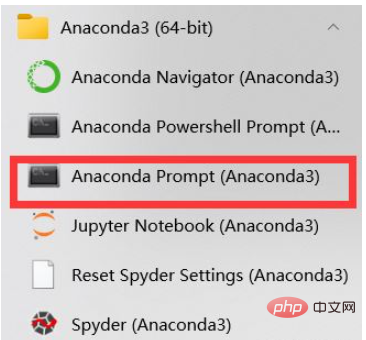
Enter
conda list
to view the currently included packages
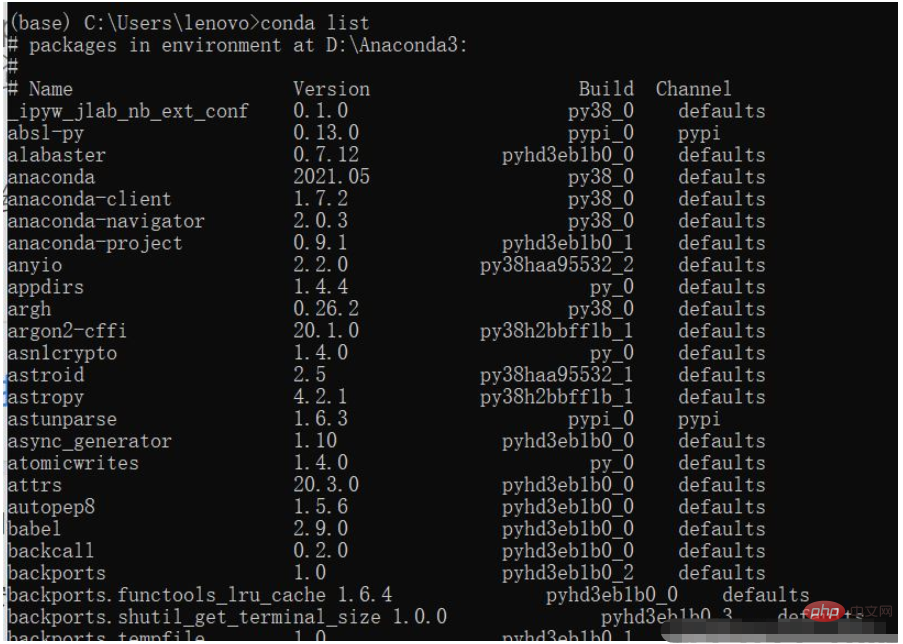
2. Check the conda version
conda --version

3. Check the environment
conda info -e

This is shown There are two environments, the first base is the default one, and the second one is an environment I created myself
4. Create a new environment
conda create -n tensorflow python=3.8
tensorflow is what you want to name this environment Name, followed by python is the version number
After entering the above command, press Enter. After waiting for a while, the following will appear, asking you whether to add these packages
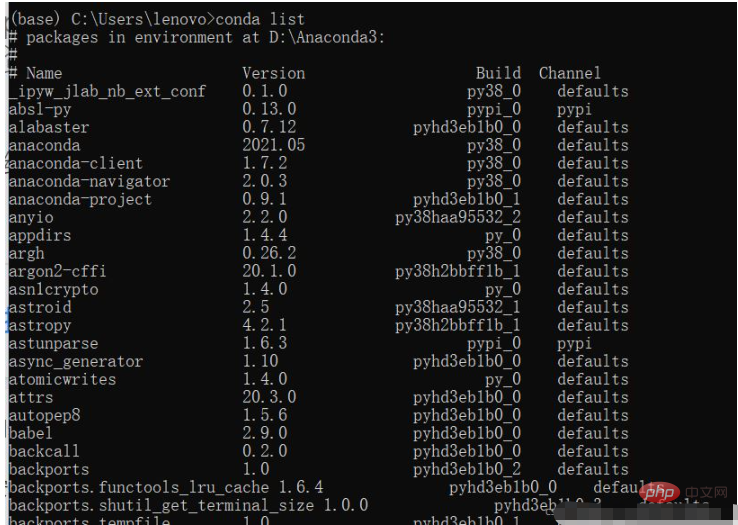
Enter
y
After waiting for a period of time, the following appears, indicating that the installation is successful
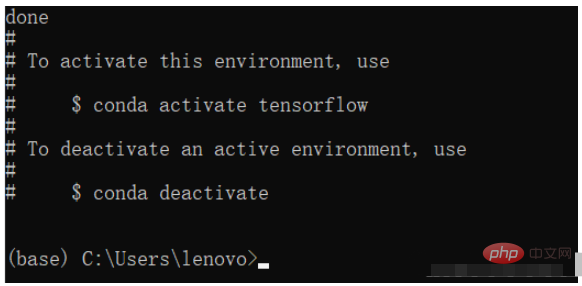
Check the environment at this time, you can see

A new environment has been created so far
5. Environment switching
It is currently the base environment. For example, I want to enter the tensorflow environment I created. Enter the following command to enter the environment
conda activate tensorflow

6.Exit the environment
conda deactivate

7.Delete the environment
n is followed by the name of the environment you want to delete
conda remove -n tensorflow --all
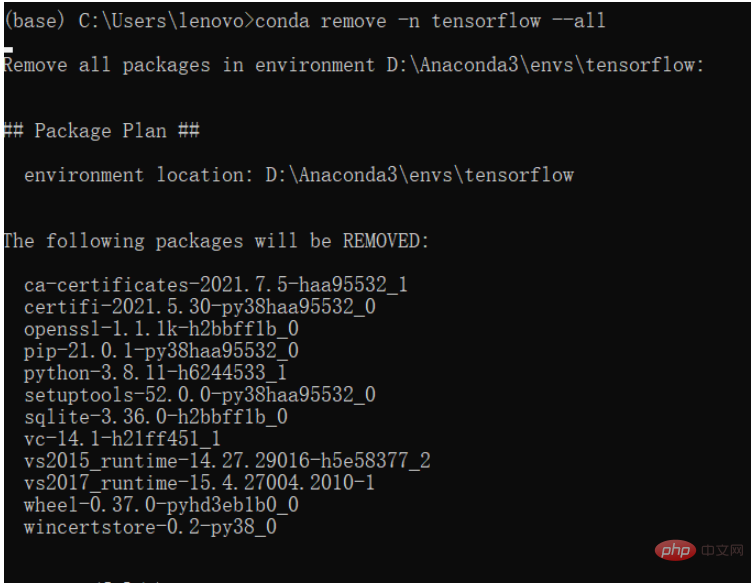
yAfter confirmation
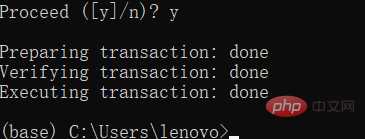
Okay It can be seen that this environment has been deleted

The above is the detailed content of What are the command operations related to conda and the environment in python?. For more information, please follow other related articles on the PHP Chinese website!

Hot AI Tools

Undresser.AI Undress
AI-powered app for creating realistic nude photos

AI Clothes Remover
Online AI tool for removing clothes from photos.

Undress AI Tool
Undress images for free

Clothoff.io
AI clothes remover

AI Hentai Generator
Generate AI Hentai for free.

Hot Article

Hot Tools

Notepad++7.3.1
Easy-to-use and free code editor

SublimeText3 Chinese version
Chinese version, very easy to use

Zend Studio 13.0.1
Powerful PHP integrated development environment

Dreamweaver CS6
Visual web development tools

SublimeText3 Mac version
God-level code editing software (SublimeText3)

Hot Topics
 What is the function of C language sum?
Apr 03, 2025 pm 02:21 PM
What is the function of C language sum?
Apr 03, 2025 pm 02:21 PM
There is no built-in sum function in C language, so it needs to be written by yourself. Sum can be achieved by traversing the array and accumulating elements: Loop version: Sum is calculated using for loop and array length. Pointer version: Use pointers to point to array elements, and efficient summing is achieved through self-increment pointers. Dynamically allocate array version: Dynamically allocate arrays and manage memory yourself, ensuring that allocated memory is freed to prevent memory leaks.
 Is the conversion speed fast when converting XML to PDF on mobile phone?
Apr 02, 2025 pm 10:09 PM
Is the conversion speed fast when converting XML to PDF on mobile phone?
Apr 02, 2025 pm 10:09 PM
The speed of mobile XML to PDF depends on the following factors: the complexity of XML structure. Mobile hardware configuration conversion method (library, algorithm) code quality optimization methods (select efficient libraries, optimize algorithms, cache data, and utilize multi-threading). Overall, there is no absolute answer and it needs to be optimized according to the specific situation.
 How to convert XML files to PDF on your phone?
Apr 02, 2025 pm 10:12 PM
How to convert XML files to PDF on your phone?
Apr 02, 2025 pm 10:12 PM
It is impossible to complete XML to PDF conversion directly on your phone with a single application. It is necessary to use cloud services, which can be achieved through two steps: 1. Convert XML to PDF in the cloud, 2. Access or download the converted PDF file on the mobile phone.
 Is there any mobile app that can convert XML into PDF?
Apr 02, 2025 pm 08:54 PM
Is there any mobile app that can convert XML into PDF?
Apr 02, 2025 pm 08:54 PM
An application that converts XML directly to PDF cannot be found because they are two fundamentally different formats. XML is used to store data, while PDF is used to display documents. To complete the transformation, you can use programming languages and libraries such as Python and ReportLab to parse XML data and generate PDF documents.
 How to convert xml into pictures
Apr 03, 2025 am 07:39 AM
How to convert xml into pictures
Apr 03, 2025 am 07:39 AM
XML can be converted to images by using an XSLT converter or image library. XSLT Converter: Use an XSLT processor and stylesheet to convert XML to images. Image Library: Use libraries such as PIL or ImageMagick to create images from XML data, such as drawing shapes and text.
 How to control the size of XML converted to images?
Apr 02, 2025 pm 07:24 PM
How to control the size of XML converted to images?
Apr 02, 2025 pm 07:24 PM
To generate images through XML, you need to use graph libraries (such as Pillow and JFreeChart) as bridges to generate images based on metadata (size, color) in XML. The key to controlling the size of the image is to adjust the values of the <width> and <height> tags in XML. However, in practical applications, the complexity of XML structure, the fineness of graph drawing, the speed of image generation and memory consumption, and the selection of image formats all have an impact on the generated image size. Therefore, it is necessary to have a deep understanding of XML structure, proficient in the graphics library, and consider factors such as optimization algorithms and image format selection.
 Recommended XML formatting tool
Apr 02, 2025 pm 09:03 PM
Recommended XML formatting tool
Apr 02, 2025 pm 09:03 PM
XML formatting tools can type code according to rules to improve readability and understanding. When selecting a tool, pay attention to customization capabilities, handling of special circumstances, performance and ease of use. Commonly used tool types include online tools, IDE plug-ins, and command-line tools.
 What is the process of converting XML into images?
Apr 02, 2025 pm 08:24 PM
What is the process of converting XML into images?
Apr 02, 2025 pm 08:24 PM
To convert XML images, you need to determine the XML data structure first, then select a suitable graphical library (such as Python's matplotlib) and method, select a visualization strategy based on the data structure, consider the data volume and image format, perform batch processing or use efficient libraries, and finally save it as PNG, JPEG, or SVG according to the needs.





